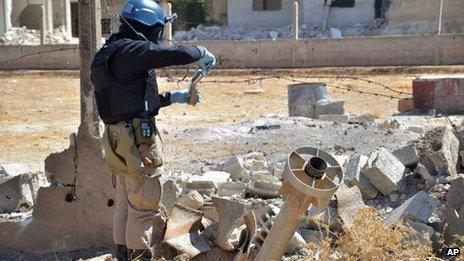Obama's 'shot across the bows' over Syria
- Published

The US is scornful of demands to wait for the outcome of the UN inspectors' report
President Obama has talked for the first time about what he wants to achieve if he takes military action against Syria.
True, he says no decision has been taken. But in his interview with PBS Newshour he said if there was action it would be to send the Syrian regime a "pretty strong signal".
He goes on to say that it would be "limited, tailored" and would not be "a repetition of, you know, Iraq, which I know a lot of people are worried about - but if we are saying in a clear and decisive but very limited way, we send a shot across the bows saying, stop doing this".
This is a distinction the Obama administration has made repeatedly - not regime change and intervening in Syria's civil war, but teaching them a lesson.
Some worry that it is impossible to draw a sensible line between the two. The speaker of the House of representatives John Boehner has written to the president, external with a number of questions, including
• What result is the administration seeking from its response?
• What is the intended effect of the potential military strikes?
• If potential strikes do not have the intended effect, will further strikes be conducted?
More than 100 members of Congress have also written to the president, calling on him to seek their approval before taking action. Mr Boehner doesn't quite call for that, but he does make it clear there are too many unanswered questions for his taste.
The president has another problem.
The UK Prime Minister David Cameron has been forced to offer MPs a second vote before taking action and to wait for a UN inspectors' report.
While administration officials have been careful not to criticise the UK, they are scornful of the UN route, saying the inspectors' report would be "redundant", insisting they will not proceed with a Security Council resolution and arguing that Syria must not be able to hide behind the United Nations.
Of course, America does not really need the UK's military help to carry out the task. But to go ahead without its closest military ally (perhaps apart from Israel) leaves the US without important diplomatic cover.
For a president who has always insisted on the importance of building international coalitions, it would be a bit embarrassing.